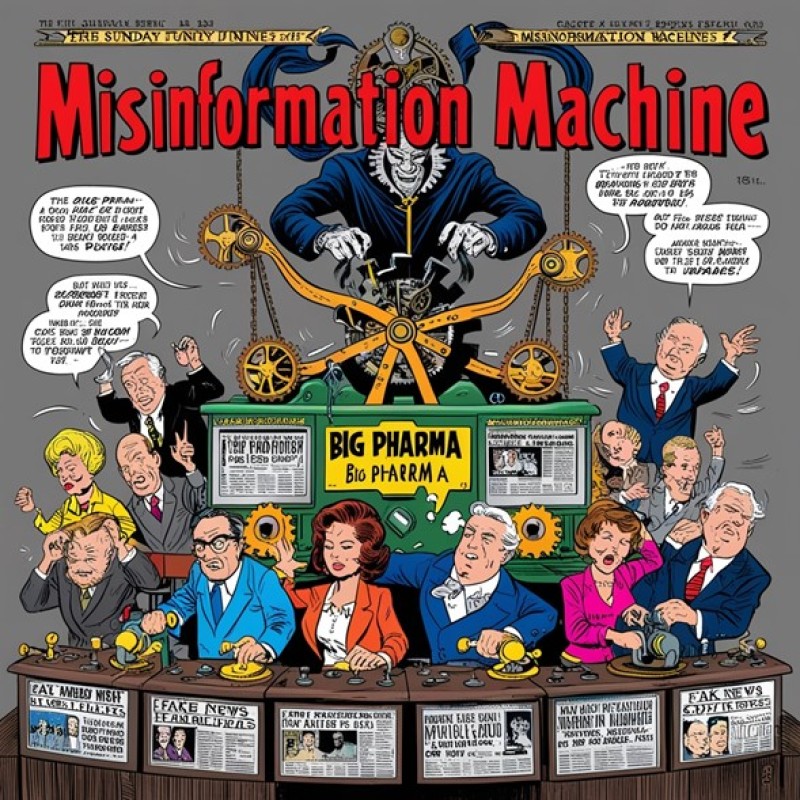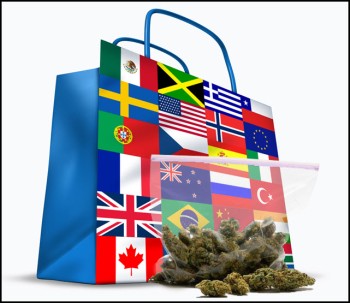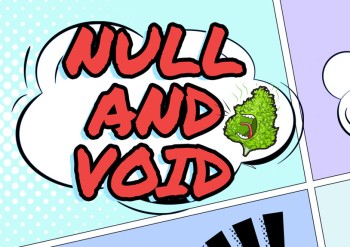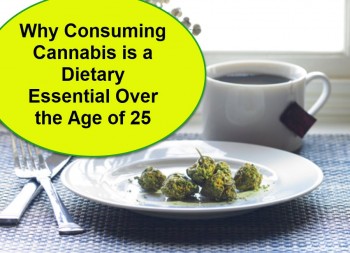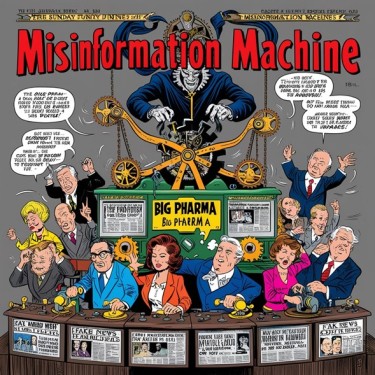
In recent years, we've heard politicians clamoring about the dangers of "misinformation" and "disinformation," with some even calling for regulations on free speech. But these same politicians seem to have a glaring blind spot when it comes to their own history of spreading falsehoods, particularly regarding cannabis.
For over a century, the U.S. government has been the primary purveyor of marijuana misinformation, running smear campaigns that have shaped public perception and policy. From outlandish claims about cannabis-induced insanity in the 1920s to Nixon's war on drugs in the 1970s, official channels have consistently peddled propaganda over facts.
The irony is palpable. While decrying the spread of misinformation in the digital age, many politicians conveniently ignore the government's long-standing role as the chief architect of cannabis myths and misconceptions.
Today, we're diving into this rich history of government-sponsored cannabis disinformation and examining recent findings from the National Institutes of Health (NIH) that reveal a telling trend: Americans don't trust official sources when it comes to marijuana information.
As we peel back the layers of propaganda and explore the roots of public mistrust, we'll see how the government's own actions have undermined its credibility on this issue. The marijuana misinformation machine has been running for decades, and it's time to set the record straight.
So buckle up, dear readers. We're about to embark on a journey through the smoky haze of cannabis history, separating fact from fiction and exposing the hypocrisy at the heart of the war on drugs. Let's dive in!
The Age of Mistrust
In an era where information is at our fingertips, it's ironic that when it comes to cannabis, Americans are turning away from traditional sources of medical knowledge. A recent study published in the Journal of Cannabis Research, partially funded by the National Institute on Drug Abuse, has shed light on this phenomenon, revealing a startling lack of trust in government and medical sources for cannabis information.
The study, which surveyed 1,161 adults nationwide, found that only 4.7% of respondents relied on government agencies for cannabis-related information. Even more surprisingly, health and medical care providers fared only slightly better at 9.3%. Instead, the majority of people turn to friends and family (35.6%) or websites (33.7%) for their cannabis knowledge.
This mistrust isn't unfounded. For decades, the U.S. government has been the primary purveyor of cannabis misinformation, running smear campaigns that have shaped public perception and policy. This propaganda has not only affected the general public but has also seeped into medical education, creating a knowledge gap among healthcare providers.
The study highlights this medical ignorance, noting that only 9% of medical schools in 2016 offered cannabis-specific curricula. This lack of education isn't necessarily the fault of individual healthcare providers, but rather a systemic issue rooted in years of government-sponsored misinformation. Many medical professionals simply haven't had the opportunity to update their "firmware" on the subject matter.
As cannabis use continues to rise and legalization spreads across the country, it's clear that the medical community needs to catch up. The study authors emphasize the "strong need for better clinician education, public outreach strategies, and improved communication between patients and clinicians about cannabis."
However, addressing this knowledge gap isn't as simple as updating medical textbooks. A separate study published in PeerJ Life & Environment reveals a troubling trend in biomedical education materials. The study found that many authors of influential medical textbooks have undisclosed financial conflicts of interest, including patents and compensation from pharmaceutical companies.
This ethical conflict of interest raises questions about the objectivity of medical education materials, particularly when it comes to topics like cannabis that could potentially threaten pharmaceutical profits. As we push for better cannabis education in medical schools, we must also address these underlying conflicts of interest to ensure that future healthcare providers receive unbiased, evidence-based information.
The age of mistrust in official sources of cannabis information presents both challenges and opportunities. While it's concerning that so few people turn to medical professionals for guidance, it also highlights the need for a major overhaul in how we educate both the public and healthcare providers about cannabis.
As we move forward, it's crucial that we address the legacy of misinformation, update medical curricula, and ensure transparency in medical education materials. Only then can we hope to bridge the trust gap and provide accurate, unbiased information about cannabis to those who need it most.
A History of Lies
The prohibition of cannabis in the United States is a tale woven with threads of deception, racism, and political manipulation. From its inception, the campaign against marijuana has relied on sensationalism and outright lies to justify its existence.
As NORML points out, the initial push for cannabis criminalization had little to do with public health or safety. Instead, it was fueled by xenophobia and racist rhetoric. A prime example is a 1927 New York Times story headlined "Mexican Family Goes Insane," which farcically claimed that a widow and her children were driven insane by eating the "marihuana plant." Such sensationalist reporting was common, with a 1933 academic paper in The Journal of Law and Criminology asserting that marijuana use inevitably resulted in "incurable" insanity and death.
At the forefront of this misinformation campaign was Harry J. Anslinger, America's first "Drug Czar." Anslinger successfully lobbied Congress to ban cannabis nationwide in 1937, relying heavily on racist rhetoric. He claimed, "There are 100,000 total marijuana smokers in the U.S., and most are Negroes, Hispanics, Filipinos, and entertainers." He even went so far as to assert that marijuana caused "white women to seek sexual relations with Negroes, entertainers, and any others."
The weaponization of cannabis misinformation reached new heights during the Nixon administration. Despite privately acknowledging that cannabis wasn't "particularly dangerous," Nixon and his team publicly doubled down on the supposed marijuana threat for political gain. John Ehrlichman, Nixon's domestic policy chief, later admitted the true motives behind their actions: "We couldn't make it illegal to be either against the (Vietnam) war or Black, but by getting the public to associate the hippies with marijuana and Blacks with heroin... we could disrupt those communities."
This legacy of lies continued well into the late 20th century with programs like D.A.R.E. (Drug Abuse Resistance Education), which perpetuated exaggerated claims about marijuana. The "lazy stoner" stereotype, heavily promoted by these campaigns, has been debunked by recent studies showing that cannabis users tend to be more active than their non-using counterparts.
Given this extensive history of deception, is it any wonder that people don't trust the government on cannabis-related information? The federal government didn't just create fake studies; they actively stonewalled legitimate research to sustain a policy founded on lies and misinformation. This deliberate suppression of scientific inquiry has had far-reaching consequences, hindering our understanding of cannabis and its potential benefits for decades.
The damage caused by this misinformation campaign extends beyond public perception. It has shaped policy, driven mass incarceration, and stifled potentially life-changing medical research. The classification of cannabis as a Schedule I substance, alongside drugs like heroin, flies in the face of scientific evidence and has been a major obstacle to comprehensive study.
This is why simply rescheduling cannabis is not enough. What we need is a complete dismantling of the Controlled Substances Act (CSA). We need an independent, unbiased group to research these substances without the weight of decades of political baggage. It's time to rethink our approach as a society to drug consumption and remove the regulatory hurdles that have long impeded research and product development.
The path forward requires more than just correcting misinformation; it demands a fundamental shift in how we approach drug policy. We must acknowledge the racist and politically motivated roots of cannabis prohibition and work to undo the harm caused by decades of lies. Only then can we hope to develop a rational, evidence-based approach to cannabis that prioritizes public health, individual liberty, and scientific truth over political agendas and corporate interests.
As we move into a new era of cannabis policy, let's learn from the mistakes of the past. It's time to replace fear-mongering with facts, propaganda with peer-reviewed research, and prohibition with sensible regulation. The history of cannabis prohibition in America is indeed a history of lies – but it doesn't have to be our future.
Where do we go from here?
After more than half a century of lies, misinformation, and propaganda, the U.S. government and healthcare establishment face a monumental task: regaining the public's trust on cannabis and drug policy. But here's the harsh truth - they can't. At least, not without radical, systemic change.
The problem runs deep. How can we trust pharma-sponsored studies when there's an obvious conflict of interest? How can we believe government agencies that have consistently prioritized political agendas over scientific truth? The credibility well has run dry, and refilling it will require more than just a change in rhetoric or policy tweaks.
The only path forward is a complete overhaul of our approach to drugs in America. This means dismantling the Controlled Substances Act (CSA) and renegotiating how we produce, distribute, and regulate drugs in the U.S. Until we take this drastic step, public trust in government agencies and healthcare providers on these issues will remain - justifiably - at rock bottom.
We need to create a new system built on transparency, scientific integrity, and genuine concern for public health. This means severing the ties between drug policy and corporate interests, political agendas, and law enforcement quotas. It means funding independent research, free from the influence of pharmaceutical companies or government agencies with a vested interest in maintaining the status quo.
Let's be clear: you can't trust a politician who takes money from Big Pharma or law enforcement unions to make unbiased decisions about drug legalization. That's like trusting an obese person's advice on losing weight - the conflict of interest is too glaring to ignore.
Moving forward, we need to demand full transparency in medical education, research funding, and policy-making. We need to elevate voices that have been historically marginalized in these discussions, including those of cannabis users, medical patients, and communities disproportionately affected by the war on drugs.
The road to rebuilding trust will be long and challenging. But it starts with acknowledging past wrongs, committing to radical change, and putting the wellbeing of individuals and communities above political and corporate interests. Only then can we hope to create a drug policy that truly serves the American people.
SOURCES:
